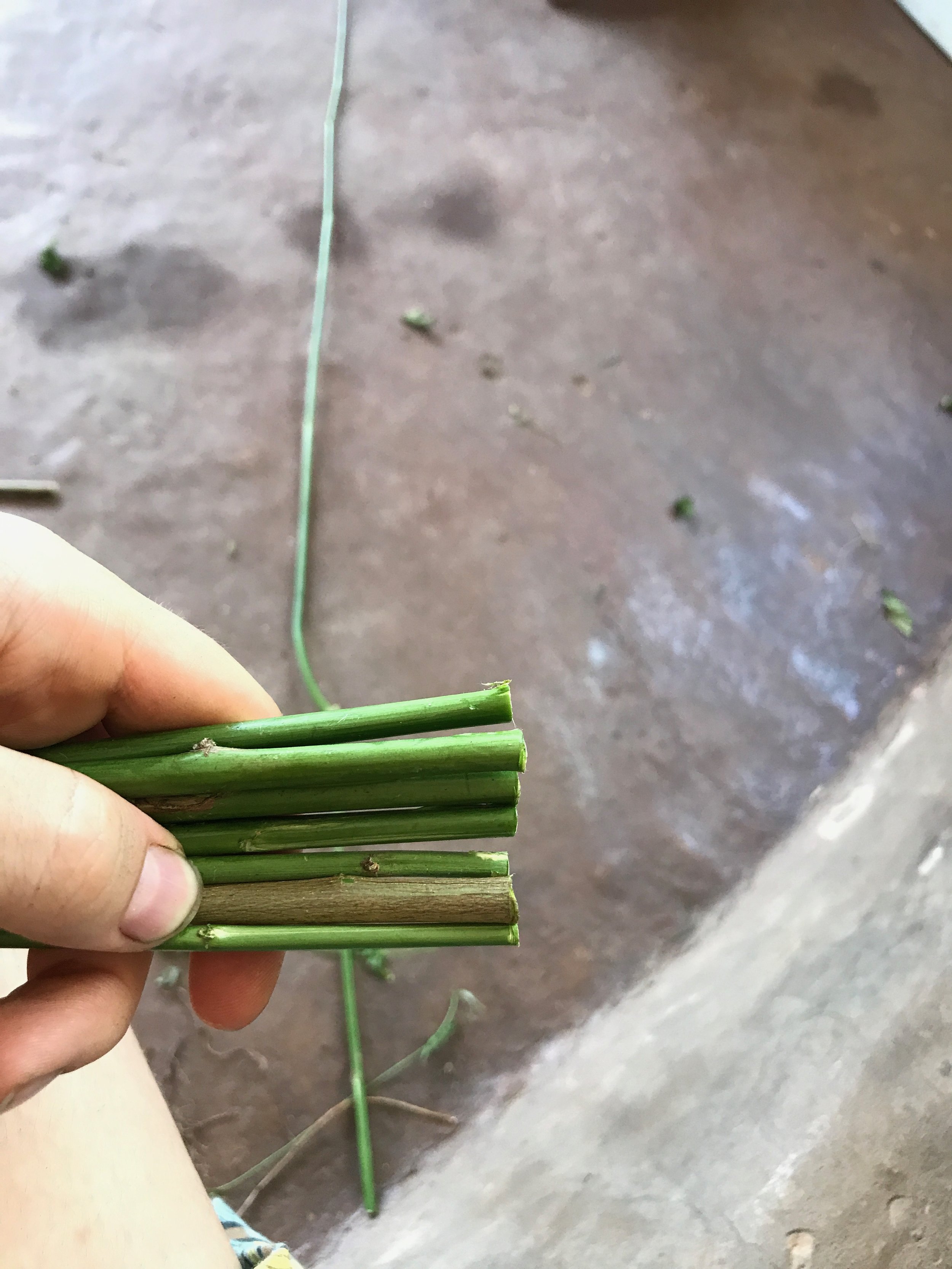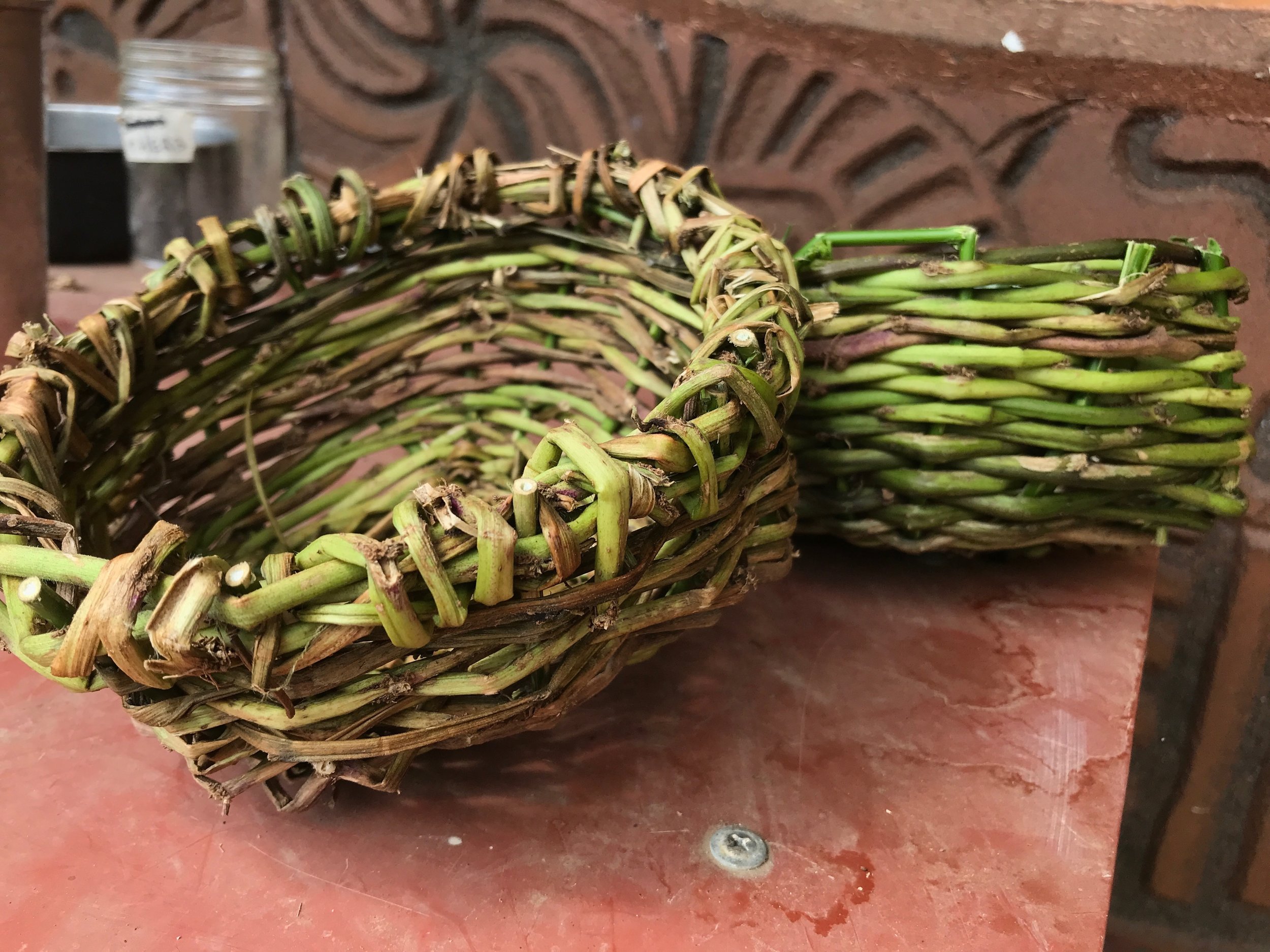How to Make a Simple Woven Basket
By Abby Kuchar, 2019 Rancho Mastatal Apprentice
One of my favorite hobbies is working with natural fibers. Soon after arriving here at the ranch as a new apprentice, I was eager to experiment with weaving a simple basket. The Ranch has an existing collection of beautiful baskets, which play an important role in storing food, while maintaining necessary airflow in this hot, humid climate.
Although I tried researching online the traditional materials used in this area for basket making, I was not able to find any specific plant recommendations. Instead, I began to explore what was readily available around the property.
Each day we enjoy delicious salads composed of greens such as katuk and the tender leaves of sweet potato vines. The result is a compost heap continuously stocked with both stakes and long, flexible vines.
Katuk, Sweet Potato vines, some examples of vines used for basket weaving.
To begin, you will want to gather eight straight(ish) katuk stems that are around the same size and a large bunch of sweet potato vines.
Step 1: Preparing the Katuk
Strip the branches and leaves off and enjoy them in a delicious salad.
Next, trim off the ends so that you are left with eight 10-12 inch long pieces (or 25-30 centimeters).
close enough!
Step 2: Prepping the Sweet Potato
The preparation of the sweet potato vine is very similar. Simply remove the leaves and the smaller vines off the sides.
I then coiled the vines to keep them tidy and “train” them into being in a tight circle, much like coiling up a garden hose.
I’ve set the thinnest one to the side to use first
Step 3: Weaving the Basket
For clearer instructions on these next few steps, I’d recommend checking out Jon’s Bushcraft tutorial on willow basket making here. Full disclosure, I was able to make a functioning basket, but the materials were a little fiddly. It’s much easier to see the steps with clean and crisp willow branches.
Start by laying out the katuk branches in a cross shape, 4 by 4.
Yes, my finger nails are very dirty
Next, take the thinnest, most flexible section of sweet potato vine and wrap around each spoke in a clockwise circle
Like I said, fiddly
After going around a second time, split your spokes in half (two katuk branches together) and begin weaving “over, under”
Voted off the basket
After another go around, split your spokes again so that you are weaving between each individual katuk branch
Continue weaving around and around. When you run out of a segment of sweet potato vine, simply lay the next piece on top of the end of the first one and continue on as normal.
After you have reached the desired size for the base of the basket, begin gently coaxing the katuk branches upward
This part can be a bit awkward. Avoid snapping your branches, but if it does happen, the weaving should still hold them in place.
When you reach the desired depth of your basket, it’s time to snip off the excess. Usually, the remainder of the stake is woven back inside the walls of the basket, forming the top edge. However, the katuk was not quite flexible enough, so I chose to use additional sweet potato vine to create a top edge.
I got my inspiration from a basket found in the main house which has some kind of plastic cordage.
Step 4: Have a local teach you how to make a proper basket
After completing my own attempt of a simple basket, I was fortunate enough to meet the older man in town who is responsible for making all the beautiful baskets around the house. He very kindly offered to show me the vines that are harvested from the forest, as well as tips for improvement for this extremely useful craft. Stay tuned for Mastatal basket making 2.0!

















